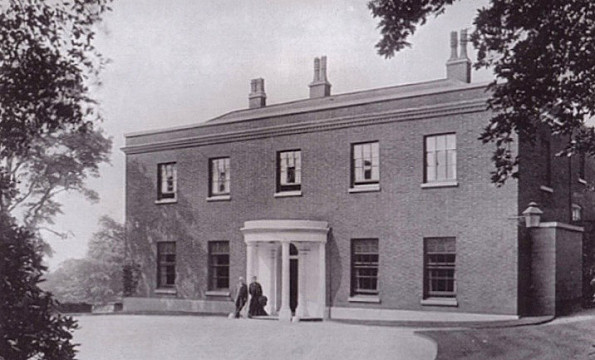Bank Hall
Heaton Norris, Stockport, Greater Manchester
Completed in 1743, for Thomas Briarly (1713-1776), Mayor of Stockport, and his wife Ann Ravald (1711-1798). After Thomas died, his widow sold the estate to John Philips whose father and uncle established J & N Philips in Manchester and were the largest manufacturers of pure linen tape in England. When he died in 1824, he was succeeded by his fourth son, Francis, who was responsible for laying out the parkland which included lakes too. His grandson, also called Francis, briefly lived here from 1861 before moving to Lee Priory in Kent. His sister, Mary Beatrice Philips (who built the church at Abbey Cwmhir Hall) was the last of the Philips family to live here before they leased it to a series of tenants and finally sold up in 1890....

This house is best associated with...
From 1861 to 1890 Bank Hall was leased to John Leech, an uncle of Beatrix Potter; Major George Arthur Fernley (1839-1914), Mayor of Stockport; Joseph Leigh; and, finally William Briggs who purchased it and its 20-acres from Francis Philips in 1890:
Standing on high ground having a southerly aspect and commanding extensive views, it contains entrance hall, three entertaining rooms, billiard room, schoolroom, with numerous bedrooms and good offices. The gardens including large tennis ground, greenhouses, wineries and productive kitchen garden, are well laid out and contain some fine timber. There are commodious stables, also shippon (cattle shed) and piggeries.
After throwing a party to celebrate their Silver Wedding Anniversary in 1912, Briggs gifted Bank Hall to the Corporation of Manchester as a school for under under-privileged girls which he suggested could be named for his wife, “Alice Briggs Home for Girls”. The school opened to both sexes but by 1938 had become boys-only. Two years later, what had been Bank Hall was destroyed in a bombing raid three days before Christmas in 1940. Today, the St. John Vianney School stands on the site of what had been the hall.
Standing on high ground having a southerly aspect and commanding extensive views, it contains entrance hall, three entertaining rooms, billiard room, schoolroom, with numerous bedrooms and good offices. The gardens including large tennis ground, greenhouses, wineries and productive kitchen garden, are well laid out and contain some fine timber. There are commodious stables, also shippon (cattle shed) and piggeries.
After throwing a party to celebrate their Silver Wedding Anniversary in 1912, Briggs gifted Bank Hall to the Corporation of Manchester as a school for under under-privileged girls which he suggested could be named for his wife, “Alice Briggs Home for Girls”. The school opened to both sexes but by 1938 had become boys-only. Two years later, what had been Bank Hall was destroyed in a bombing raid three days before Christmas in 1940. Today, the St. John Vianney School stands on the site of what had been the hall.
You May Also Like...
Categories
Styles
Share
Connections
Be the first to connect to this house. Connect to record your link to this house. or just to show you love it! Connect to Bank Hall →












